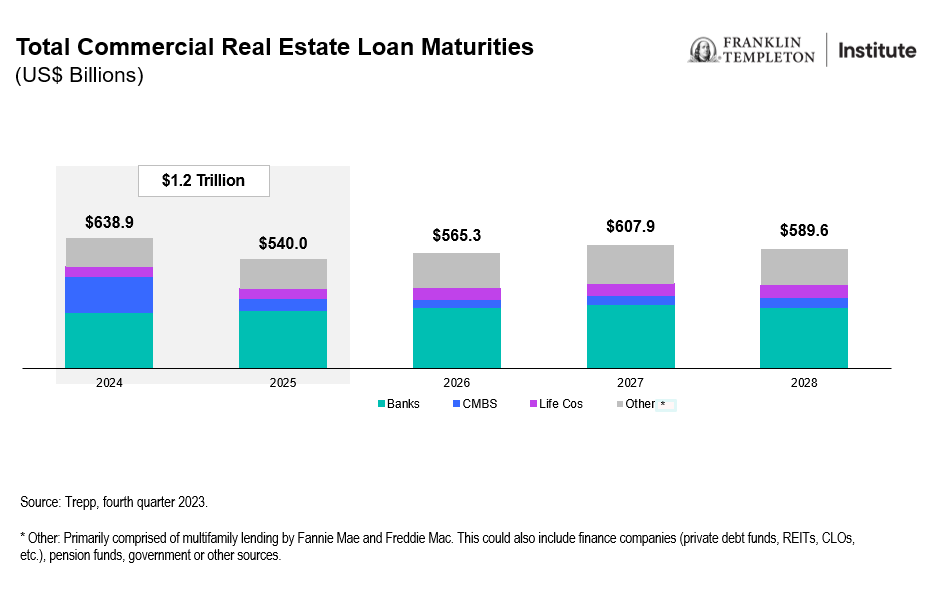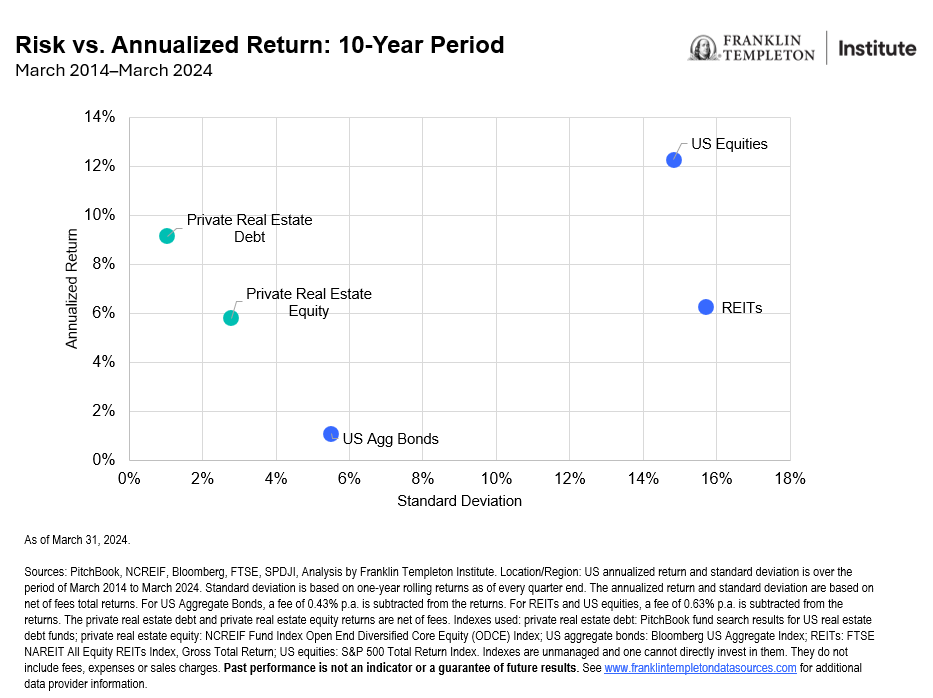In our latest episode of the Alternative Allocations podcast series, I had the opportunity to sit down with Richard Byrne, President of Benefit Street Partners, to discuss opportunities in commercial real estate debt. We examined challenges facing real estate broadly, from falling valuations to the disruption in the office sector.
Rich believes that the disruption in real estate creates unique opportunities to be a lender, especially since banks will likely be hesitant to lend to these troubled assets in the future. He described the depth and breadth of opportunities his firm is seeing—from construction loans to mezzanine to CMBS (commercial mortgage-backed securities). While office valuations have come down, Rich believes they will likely fall further before he considers them reasonably priced.
Rich had a much more positive view about multifamily, as there is not enough inventory, and elevated mortgage rates make owning a new home out of reach for many families. He feels that there will be multifamily opportunities across multiple markets.
We discussed the US$2 trillion “Wall of Maturities” that will need to be refinanced in the next four years (see Exhibit 1). If banks are unwilling to lend, this creates an opportunity for managers who have the capital and expertise. Experienced managers can dictate the valuations and terms.
Exhibit 1: Wall of Maturities
I asked Rich where he saw the best opportunities. He said “I think opportunity number one is buying troubled assets from banks or from whomever was going to need to sell things over time and inheriting somebody else’s problems, but hopefully at the right price. That’s an interesting business.” He emphasized “at the right price” throughout our discussion.
Rich and I discussed how advisors should allocate to commercial real estate debt, and the role(s) it can play in client portfolios. Commercial real estate debt has historically delivered strong risk-adjusted returns, an illiquidity premium relative to public market equivalents, low-to-negative correlation to traditional investments, and downside protection (see Exhibit 2).
Exhibit 2: Risk vs. Annualized Return: 10-Year Period
Commercial real estate debt has priority in the capital structure hierarchy (“Cap-Stack”), meaning debt holders get paid before mezzanine and equity holders. This is an important consideration given the headwinds for real estate.
For more information check out https://www.franklintempletonglobal.com/articles/2024/institute/commercial-real-estate-debt-another-way-to-access-real-estate.
Make sure you don’t miss an episode by subscribing to Alternative Allocations on Apple, Spotify or wherever you get your podcast.
WHAT ARE THE RISKS?
All investments involve risks, including possible loss of principal.
Investments in many alternative investment strategies are complex and speculative, entail significant risk and should not be considered a complete investment program. Depending on the product invested in, an investment in alternative strategies may provide for only limited liquidity and is suitable only for persons who can afford to lose the entire amount of their investment. Diversification does not guarantee a profit or protect against a loss.
Risks of investing in real estate investments include but are not limited to fluctuations in lease occupancy rates and operating expenses, variations in rental schedules, which in turn may be adversely affected by local, state, national or international economic conditions. Such conditions may be impacted by the supply and demand for real estate properties, zoning laws, rent control laws, real property taxes, the availability and costs of financing, and environmental laws. Furthermore, investments in real estate are also impacted by market disruptions caused by regional concerns, political upheaval, sovereign debt crises, and uninsured losses (generally from catastrophic events such as earthquakes, floods and wars). Investments in real estate related securities, such as asset-backed or mortgage-backed securities are subject to prepayment and extension risks
An investment in private securities (such as private equity or private credit) or vehicles which invest in them, should be viewed as illiquid and may require a long-term commitment with no certainty of return. The value of and return on such investments will vary due to, among other things, changes in market rates of interest, general economic conditions, economic conditions in particular industries, the condition of financial markets and the financial condition of the issuers of the investments. There also can be no assurance that companies will list their securities on a securities exchange, as such, the lack of an established, liquid secondary market for some investments may have an adverse effect on the market value of those investments and on an investor’s ability to dispose of them at a favorable time or price. Past performance does not guarantee future results.
IMPORTANT LEGAL INFORMATION
This material is intended to be of general interest only and should not be construed as individual investment advice or a recommendation or solicitation to buy, sell or hold any security or to adopt any investment strategy. It does not constitute legal or tax advice. This material may not be reproduced, distributed or published without prior written permission from Franklin Templeton.
The views expressed are those of the investment manager and the comments, opinions and analyses are rendered as at publication date and may change without notice. The underlying assumptions and these views are subject to change based on market and other conditions and may differ from other portfolio managers or of the firm as a whole. The information provided in this material is not intended as a complete analysis of every material fact regarding any country, region or market. There is no assurance that any prediction, projection or forecast on the economy, stock market, bond market or the economic trends of the markets will be realized. The value of investments and the income from them can go down as well as up and you may not get back the full amount that you invested. Past performance is not necessarily indicative nor a guarantee of future performance. All investments involve risks, including possible loss of principal.
Any research and analysis contained in this material has been procured by Franklin Templeton for its own purposes and may be acted upon in that connection and, as such, is provided to you incidentally. Data from third party sources may have been used in the preparation of this material and Franklin Templeton (“FT”) has not independently verified, validated or audited such data. Although information has been obtained from sources that Franklin Templeton believes to be reliable, no guarantee can be given as to its accuracy and such information may be incomplete or condensed and may be subject to change at any time without notice. The mention of any individual securities should neither constitute nor be construed as a recommendation to purchase, hold or sell any securities, and the information provided regarding such individual securities (if any) is not a sufficient basis upon which to make an investment decision. FT accepts no liability whatsoever for any loss arising from use of this information and reliance upon the comments, opinions and analyses in the material is at the sole discretion of the user.
Products, services and information may not be available in all jurisdictions and are offered outside the U.S. by other FT affiliates and/or their distributors as local laws and regulation permits. Please consult your own financial professional or Franklin Templeton institutional contact for further information on availability of products and services in your jurisdiction.
Issued in the U.S, by Franklin Templeton, One Franklin Parkway, San Mateo, California 94403-1906, (800) DIAL BEN/342-5236, franklintempleton.com. Investments are not FDIC insured; may lose value; and are not bank guaranteed.



